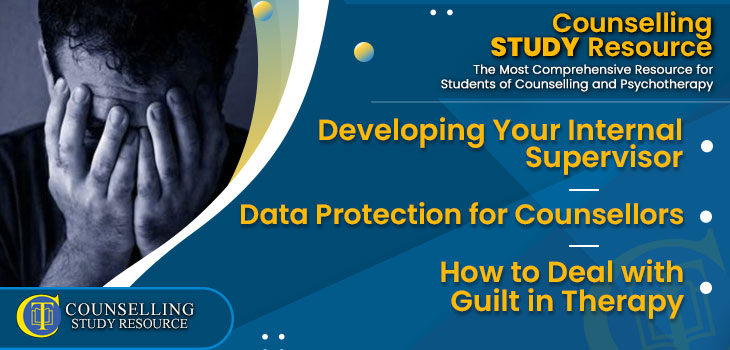244 – How to Deal with Guilt in Therapy
Developing Your Internal Supervisor – Data Protection for Counsellors
In Episode 244 of the Counselling Tutor Podcast, your hosts Rory Lees-Oakes and Ken Kelly are back with this week’s three topics:
- Firstly in ‘Theory in Practice’ we talk about developing your internal supervisor.
- Then in ‘Practice Partner’ Rory and Ken discuss how we keep, store and manage data.
- And lastly in ‘Practice Matters’ Rory speaks with Amy Launder on how to deal with guilt in therapy.
Developing Your Internal Supervisor [starts at 03:23 mins]
Counselling Foundations is sponsored by
Counselling Skills Academy
Learn counselling techniques by seeing counselling skills used in real sessions by qualified therapists.
Real sessions - real-life presentations - real skills.
It’s important to develop your own interior supervisor for when you encounter something in the therapy room without your external supervisor there to help you in the moment.
The key moments of this section include:
- In order to develop your internal supervisor, you’ll need to use your therapeutic conscience – stopping yourself, asking yourself questions, etc.
- You can start putting yourself in the place of the client and thinking about what you need to do for them in that moment.
- The longer you’ve been in practice, the easier it’ll be to tune into this interior supervisor.
- Use your external supervisor to help you improve your internal supervisor.
- Ask your supervisor what processes they go through when helping you, this will give you a framework to map your internal supervisor to.
- Your internal supervisor sets you up to be a better supervisee – you can recognise and better lay out what to you need to work on to your supervisor.
A handout on Developing Your Internal Supervisor is available for download in the green button above.
Data Protection for Counsellors [starts at 20:08 mins]
A necessary part of your practice is data protection – this involves legislation that you can’t avoid or ignore.
The main points of this discussion are:
- The General Data Protection Regulation (GDPR) provides the legislation that must be followed in the EU – for the UK, it is now the UK GDPR that must be followed.
- The UK GDPR covers storing and protecting all personal data that is shared with us as counsellors – this includes name, address, phone number and email.
- There is also the storage of your clinical notes – these are incredibly personal to the client and must be protected correctly.
- Data you collect must be used fairly and only in the way the client expects it/has been told it will be used – it cannot be passed on without informed/explicit consent.
- A client has the right to ask you for access to their clinical notes and the right to erase/be forgotten (excluding some circumstances).
To find out more information on what your obligations are in terms of data storage and protection, look at the Information Commissioner’s Office (ICO).
How to Deal with Guilt in Therapy [starts at 41:00 mins]
The National Counselling Society is proud to sponsor Practice Matters.
NCS are really excited to have launched their Children and Young People Therapist Register for counsellors working with the younger age group.
In this week’s ‘Practice Matters’, Rory speaks with Amy Launder on helping clients deal with guilt and shame in therapy.
The key points of this discussion include:
- Signs of a client experiencing shame and/or guilt could be things such as frequent self-blame or putting themselves down.
- When dealing with guilt in therapy, remember that ideas of shame and guilt often come from experiences had in childhood.
- Shame runs deeper than guilt – ‘I’m a bad person’ (shame) vs. ‘I’ve done a bad thing’ (guilt).
- To help a client deal with guilt in therapy, ask them, ‘If you were caught and arrested for X, how long would your sentence be?’ – more often than not the client has been punishing themselves for far longer.
- Try to reframe and normalise something that has brought about guilt and/or shame for the client.
- Shame and guilt are both useful – they link to our morals and perception of good and bad. But when held onto for too long or felt where it is inappropriate/unnecessary, they become problematic.


